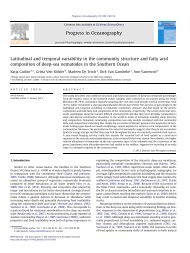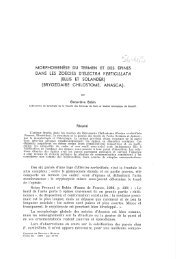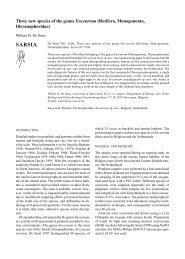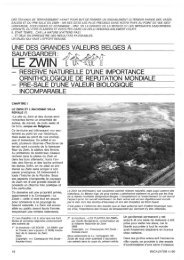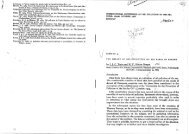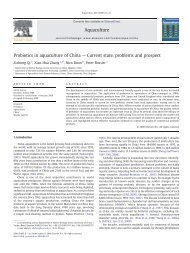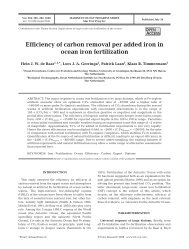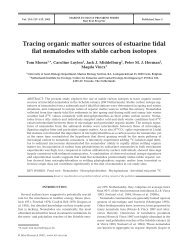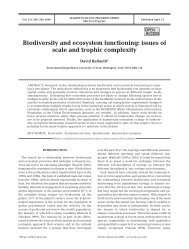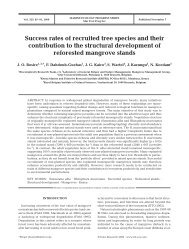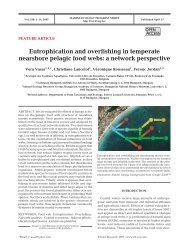EurOCEAN 2000 - Vlaams Instituut voor de Zee
EurOCEAN 2000 - Vlaams Instituut voor de Zee
EurOCEAN 2000 - Vlaams Instituut voor de Zee
Create successful ePaper yourself
Turn your PDF publications into a flip-book with our unique Google optimized e-Paper software.
THE PIONEER PROJECT AS AN EXAMPLE OF OPERATIONAL<br />
ANALYSIS<br />
Hans v. Storch, GKSS Forschungszentrum, Institut für Gewässerphysik, Max-Planck-Straße,<br />
D-21502 Geesthacht; Hans Wackernagel ARMINES,Centre <strong>de</strong> Géostatistique 35, rue Saint<br />
Honoré, F 77305 Fontainebleau ; Pierre Regnier Danish Hydraulic Institute, Ecological<br />
Mo<strong>de</strong>lling Centre (EMC),Agern Allé 5,DK-2970 Hørsholm; Morten Pejrup Institute of<br />
Geography, University of Copenhagen,Oester Voldga<strong>de</strong> 10, DK-1350 Copenhagen; Ryszard<br />
Ewertowski Maritime Research Institute, Szczecin Branch, ul. Monte Cassino 18a, PL-70-467<br />
Szczecin; Geir Evensen, Nansen Environmental and Remote Sensing Center, Edvard Griegsvei<br />
3a, N-5037 Solheimsviken; Piet Ruardij Ne<strong>de</strong>rlands Institut <strong>voor</strong> On<strong>de</strong>rzoek <strong>de</strong>r <strong>Zee</strong>,<br />
Department: Biological Oceanography, P.O. Box 59, 1790 AB Den Burg, NL-Texel;<br />
Wladyslaw Buchholz ,Technical University Water Environment Engineering Department,<br />
Piastow 50, PL-70-310 Szczecin; Joan Pau Sierra, Universidad Politecnica <strong>de</strong> Catalunya,<br />
Laboratori d'Enginyeria Maritima, Gran Capitá s/n, Módul D-1, Es-08034 Barcelona; Julio<br />
González <strong>de</strong>l Río Rams, Universidad Politecnica <strong>de</strong> Valencia, Dep. <strong>de</strong> Ingeniería Hidráulica y<br />
Medio Ambiente, Camino <strong>de</strong> Vvera s/n, ES-46080 Valencia; Erik Koch Rasmussen VKI<br />
Ecological Mo<strong>de</strong>lling Center (EMC),Agern Allé 5, DK- 2970 Hørsholm<br />
INTRODUCTION<br />
After <strong>de</strong>ca<strong>de</strong>s of successful research into the un<strong>de</strong>rstanding of processes the coastal<br />
environment and the <strong>de</strong>velopment of quasi-realistic dynamical mo<strong>de</strong>ls, the overall scope of<br />
coastal research is beginning to focus on applications. Systems analysis helps to comprehend<br />
the coast as one environment, and allows the reconstruction of past <strong>de</strong>velopments as well as the<br />
construction of plausible scenarios of possible future <strong>de</strong>velopments. Operational analysis<br />
provi<strong>de</strong>s governmental and commercial users with low-cost, real time information about the<br />
<strong>de</strong>tailed state and near-future evolution of the coastal seas. Finally, un<strong>de</strong>rstanding of the social<br />
dynamics responsible for the political <strong>de</strong>cision process is mandatory for facilitating the<br />
rational use of natural science knowledge in managing the coast. The European project<br />
“Preparation and Integration of Analysis Tools towards Operational Forecast of Nutrients in<br />
Estuaries of European Rivers” (PIONEER) is an attempt to implement operational analysis in<br />
coastal zone management. In the project a prototypical marine integrated monitoring system is<br />
built which merges low-cost specific observational measures with routine general monitoring<br />
data and quasi-realistic mo<strong>de</strong>ls. This system will <strong>de</strong>liver low-cost, real-time spatially<br />
disaggregated distributions of nutrients in coastal waters. The system will be set up for the test<br />
cases Lower Odra, Odra Lagoon and Ebro Delta. PIONEER is fun<strong>de</strong>d within the 4 th EC<br />
framework programme MAST III (Projekt) and coordinated by GKSS research center<br />
Geesthacht. The general concept of the PIONEER project is outlined in this article.<br />
THE PIONEER APPROACH<br />
The main tasks of coastal environmental research are the generation of knowledge about the<br />
state of the environmental system and its change, and about the dynamical functioning of this<br />
systems and its sensitivity against anthropogenic modifications. To the former we refer as<br />
operational analysis, and to the latter as systems analysis.<br />
Operational Analysis<br />
Information about the physical, chemical and biological state of the coastal zone is nee<strong>de</strong>d for<br />
averting and managing dangerous situations such as storm surges optimizing the use of<br />
451



